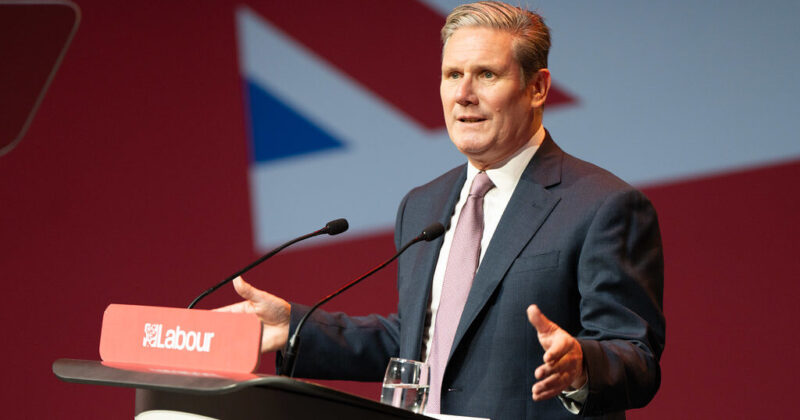

By Dave Stockton
As we go to press, the Labour Party Conference is assembling in Liverpool. With its many fringe events it has been promoted as the largest such gathering in years. But it will be unlike the gatherings of social movement activists in the Corbyn years. The Guardian reported in September that a total of 300 CEOs and chairs of the UK’s top companies would be swanning around the conference venue.
Business sponsorships have risen from £20,000 last year to £500,000 this year. Clearly with a lead of 20% lead in the polls and the Rutherglen and Hamilton triumph in the bag, British bosses are turning to Labour and deserting the feuding Tories. They are yearning for a safer pair of hands for their class interests and Starmer is their man.
They look to him to undo the damage done by Brexit, which has left Britain without even the modest recovery from the economic effects of Covid experienced in the EU and US. They look across the Atlantic to the example of Joe Biden’s $369bn Inflation Reduction Act – a huge state capitalist handout to private business.
But Starmer has to be cautious, still trying to lay the ghost of the ‘tax and spend Labour’ myth the Tories pinned on ‘prudent’ Gordon Brown after the Great Recession, falsely claiming that this was due to profligate spending on social services, not on bailing out the banks.
Labour is haunted by this. That’s why we’ve seen in the turnaround of Ed Miliband’s £28bn per annum Green Prosperity plan, using state subsidies to attract private investors to partner with the public sector in technologies for renewable power, the production of electric vehicles and heat pump installations. This was based on Biden’s own public-private partnership strategy – hardly a ‘socialist’ intervention.
But it was punctured in June by shadow chancellor Rachel Reeves, announcing that this figure would only be reached in the second half of Labour’s first term and even then projects could only go ahead if there was a three-to-one private to public investment ratio. This would give City financiers and the world’s bond markets a veto on projects to tackle climate change.
Labour spokespersons are constantly reneging on their previous promises. Starmer’s Ten Pledges, made to become Leader, quickly disappeared. But anything concrete in his later ‘Five Bold Missions for a Labour Britain’ is now being subjected to revision because ‘the Tories crashed the economy’ and the Bank of England’s relentless interest rate rises make cheap borrowing no longer an option.
Once again the promise has been made to subject all of Labour’s spending plans to the Office for Budget Responsibility. Labour is trying to put all the major social reforms that the constituency parties and trade unions want under the hatchet of the bankers.
Labour is getting in early with the old excuse for reneging on election pledges: ‘we found a terrible mess when we took office’. In fact the Guardian and the Financial Times report that much of big business finds Starmer’s plans ‘unambitious’ when it comes to infrastructure projects, a judgement confirmed by his swift announcement that Labour will not commit to reversing Sunak’s cancellation of HS2’s northern leg.
Other ditchings include ending the charitable status of private schools. In 2021 Rachel Reeves told Labour Conference to loud cheers; ‘Here’s the truth: private schools are not charities. And so we will end that exemption and put that money straight into our state schools. That is what a Labour government will do.’ She claimed this would raise £1.7 billion to spend on state schools. Now Labour will not do this.
Other scrappages have gone the same way. A year ago Starmer tweeted, ‘We must scrap the inhumane Work Capability Assessments and private provision of disability assessments [e.g. ATOS], scrap punitive sanctions, the two-child limit [on child allowance] and benefits cap.’
But on 16 July, he told the BBC’s Laura Kuenssberg he was ‘not changing’ Tory policy regarding the two-child limit. Another policy thrown overboard is the abolition of student tuition fees, a popular pledge inherited from Corbyn’s 2017 manifesto, and was one of Starmer’s Ten Pledges while running to be leader in 2020.
Gone too is Labour’s commitment to increasing income tax for the top 5% of earners. Now it seems all taxes are too high. So where will the money come from to pay for desperately needed staff increases and repairs for our schools, hospitals and care homes? Likewise, he has made it clear that re-nationalisation of the railways and other utilities are out. On immigration Labour is in full flight. While condemning Suella Braverman’s inflammatory rhetoric, they have agreed that the ‘prison hulk’ refugee barges will stay.
In short, Labour under Starmer has abandoned nearly all of the policies which have the potential to improve the living standards of workers that would also require substantial investment, which in turn would require taxing the super-rich to pay for them.
It is clear that his intention is to govern in the interests of big business while offering the same cocktail of austerity and reaction as the Tories, repackaged under the Labour brand. If we want to stop him, we need to organise in our unions and transform them into fighting organisations of the working class, willing and able to hold a future Labour government to account.